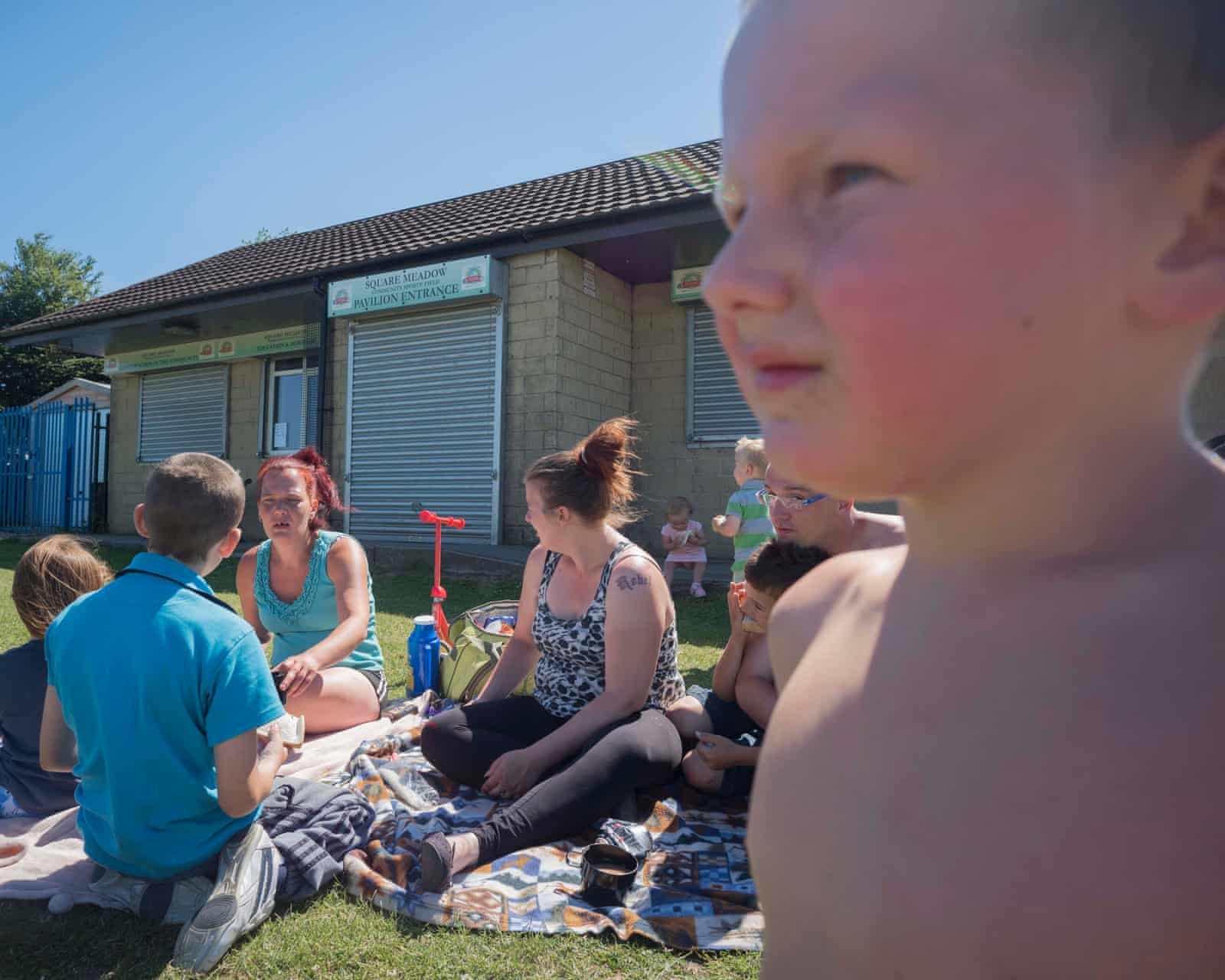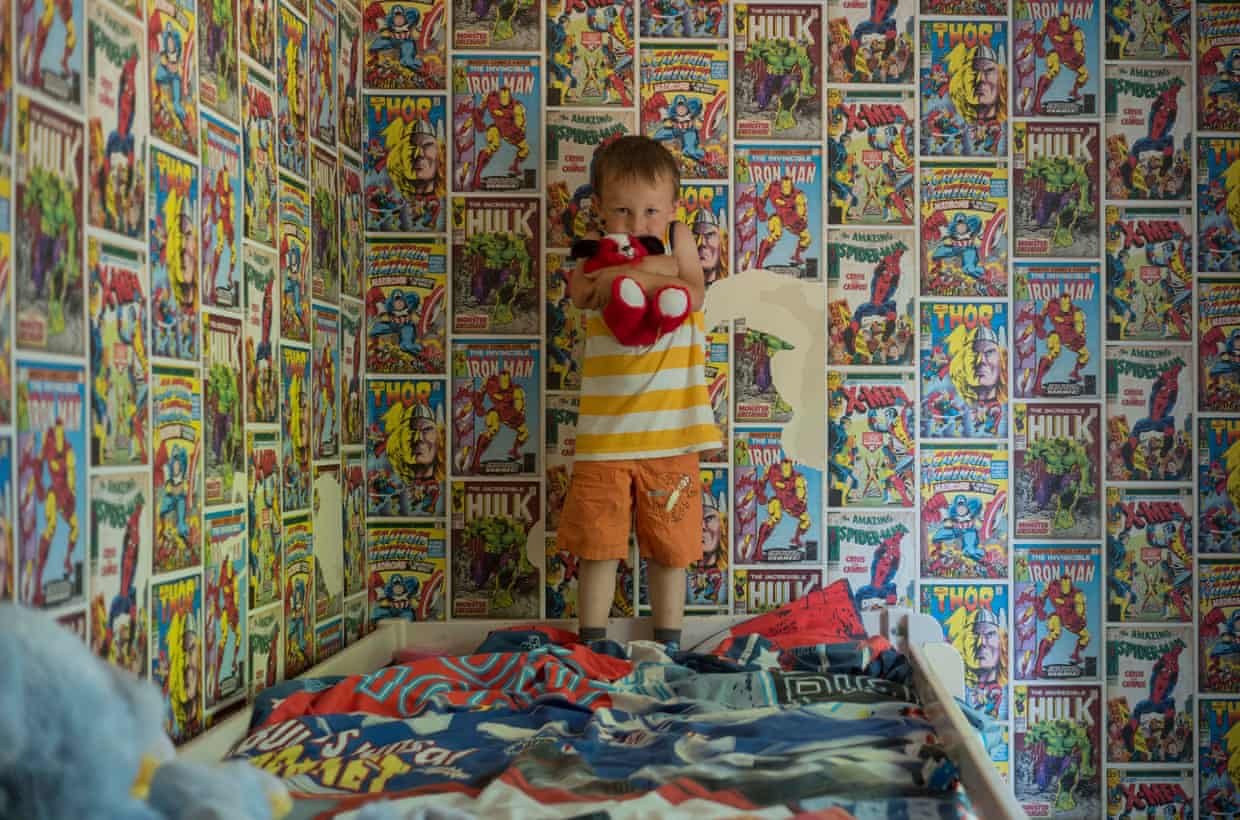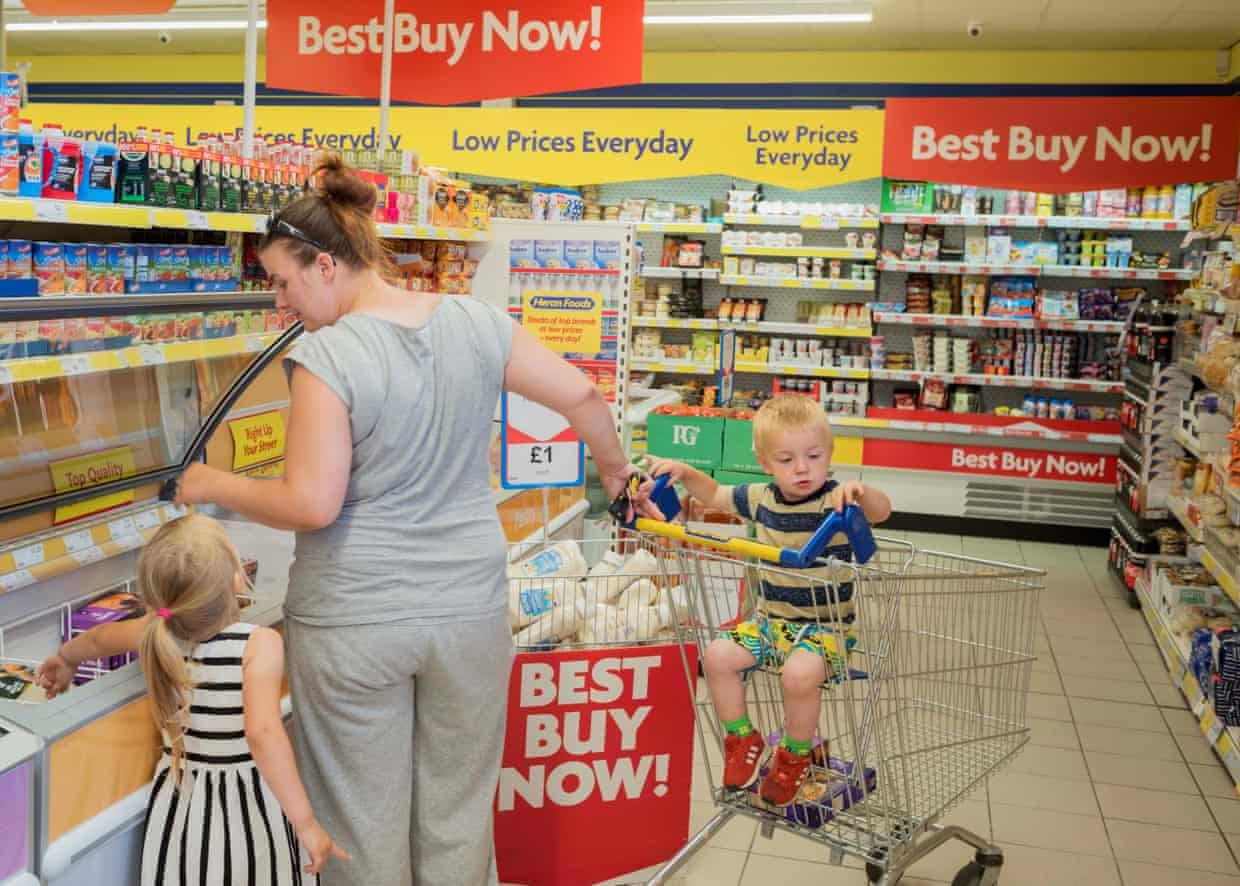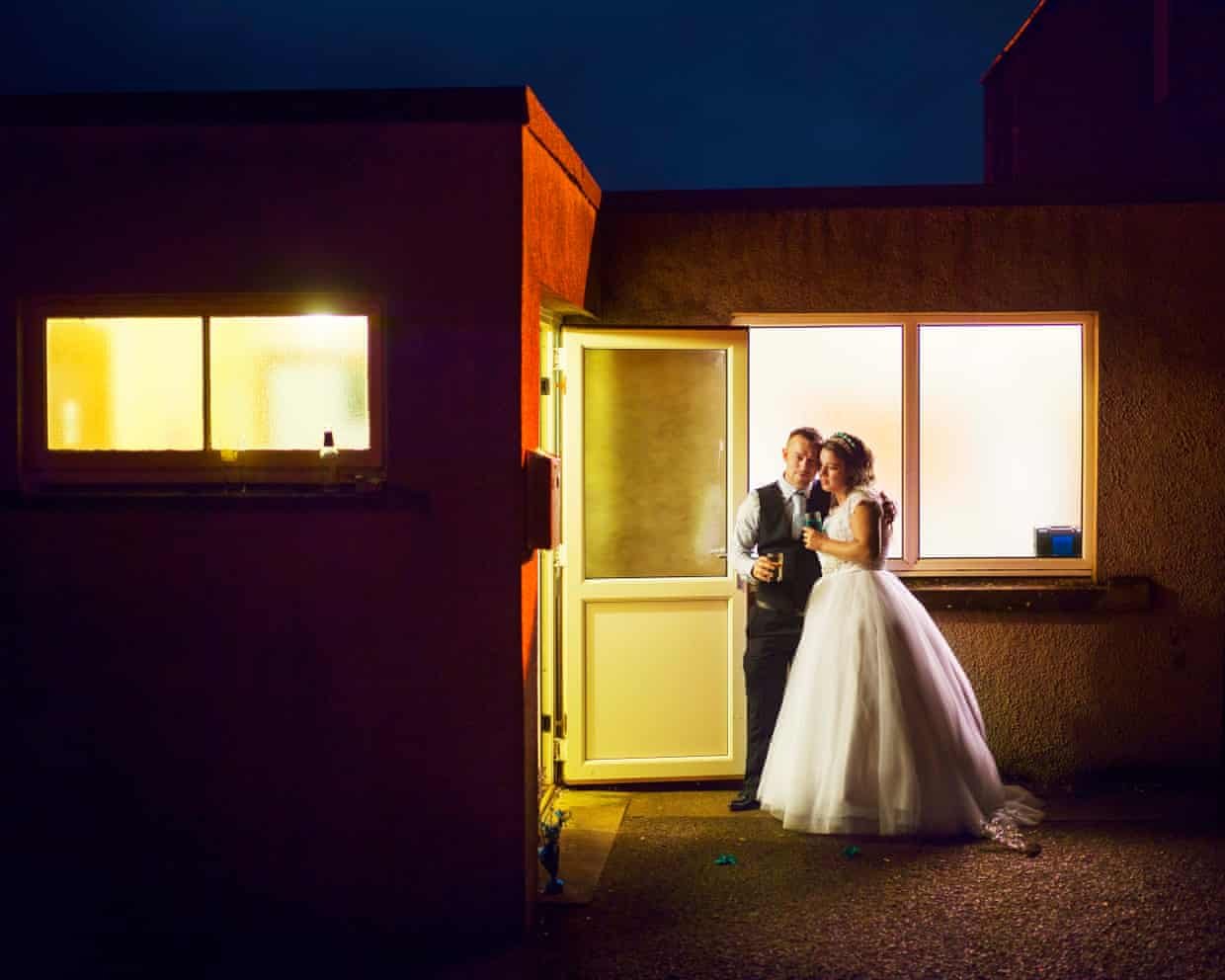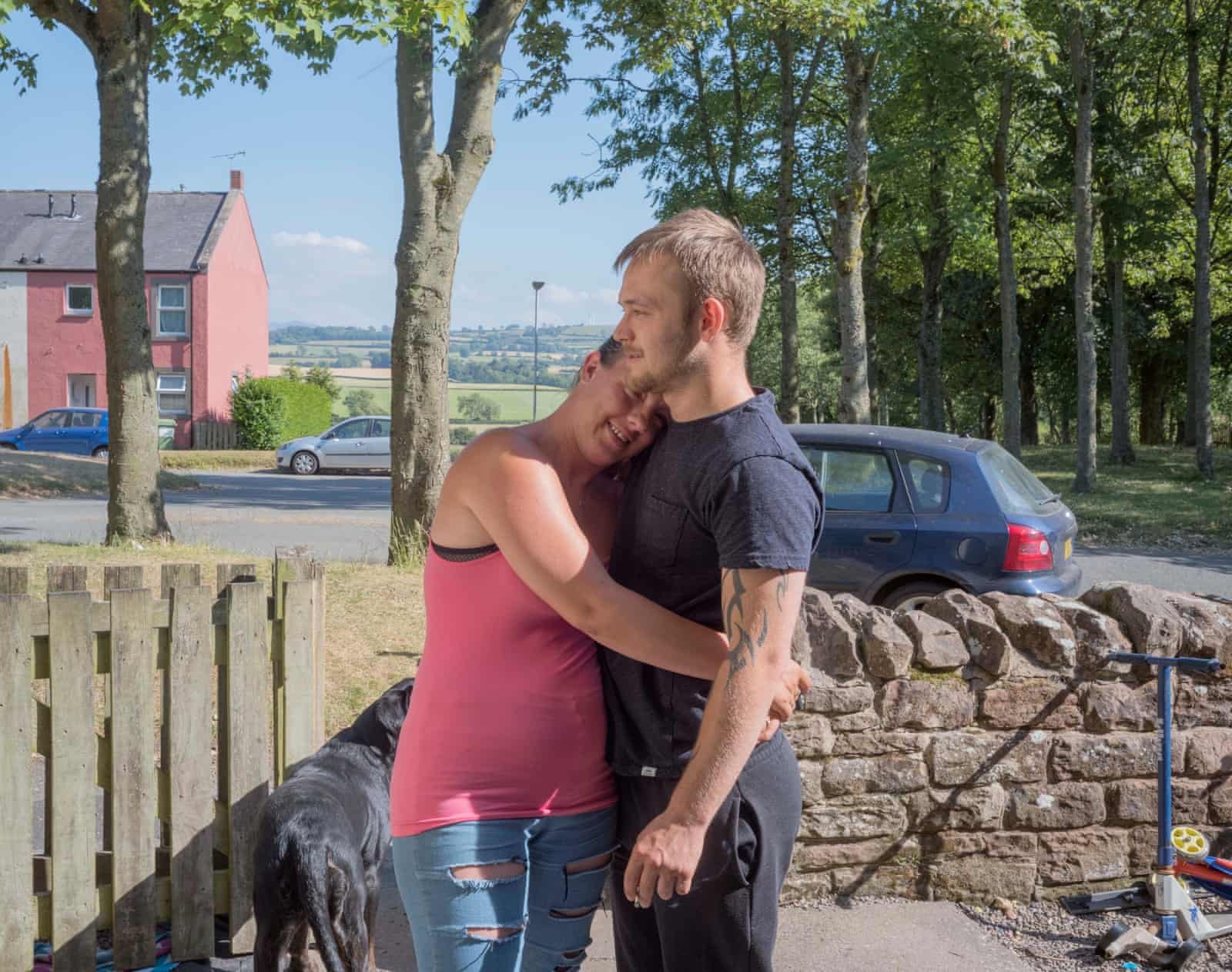This photo caused shock waves in 1992, where are its subjects now?
Craig Easton’s photographs of the Williams family in Blackpool in the early 90s exposed Thatcherism’s legacy of child poverty. Over two decades later, he tracked them down
-Published in the Guardian
-Cumbria and Darwen, Lancashire / November 2020
-Also available as a standalone photo book - which was shortlisted for the 2023 Orwell Prize in the ‘Exposing Britain’s Social Evils’ category - featuring an expanded text essay by Jack Shenker
-Original photography by Craig Easton
When Katrina first saw the photo, she cried. The four-year-old girl at its centre is seated at a dinner table, with chips on her plate and a fork in her hand. Behind her, the walls of the room are bare and grimy. The toddler’s eyes are fixed on the middle distance – possibly sad, possibly thoughtful, wholly absorbed in a world that lies just off the page. “I didn’t recognise myself,” says Katrina, known as Kat and now 31. “I had to be told who it was.”
Kat’s journey in the decades since that picture was taken, in 1992, has been a convoluted one: from a homeless hostel in Blackpool to troubled teenage years in Blackburn and a small terrace house in northern Cumbria, where toys spill from the front garden and the view stretches across the fields of the Solway Plain. But one recurring feature has been the presence of photographer Craig Easton, who was there to capture images of Kat and her five siblings when they were young children, and is here again today, as most of them bring up young children of their own.
“Back then, it was all shabby and run-down,” observes Mark, Kat’s older brother, who lives in Darwen, Lancashire. “Now it’s… I don’t know. I guess it’s what we’ve made of it.”
That uncertain distance to the past, and the unequal way our history shapes and stains the present, is one of the many threads running through Easton’s most ambitious work: his ongoing documentation of the Williams family, which began with a one-off shoot in 1992 and has gone on to dominate the last four years of his life, ever since he reconnected with his subjects.
The catalyst for that initial project was a speech given to the 1992 Conservative party conference by Peter Lilley, then secretary of state for social security, in which he announced his determination to “close down the something-for-nothing society”, parodying a song from Gilbert and Sullivan’s The Mikado. “I’ve got a little list / Of benefit offenders who I’ll soon be rooting out / And who never would be missed,” Lilley declared, to cheers. “There’s young ladies who get pregnant just to jump the housing queue / And dads who won’t support the kids / Of ladies they have… kissed.
Lilley’s performance became emblematic of Tory government attitudes towards working-class people, in a country still reeling from recession. When the French newspaper Libération dispatched a journalist to northern England in an attempt to find out what this “something-for-nothing” society looked like, Easton was asked to take the accompanying photographs, which is how he ended up in an overcrowded two-bedroom council flat in Blackpool’s red-light district, watching Kat, Mark and their siblings eat, play and squabble on a threadbare carpet.
Their parents, Mandy and Mick Williams, had owned a courier business in the mid-80s, but in the space of a few short years, a series of events transformed their fortunes: first, a family relocation that separated them from the firm; then a national financial downturn; and finally, Mick being made redundant from successive jobs as a removals man and a hotel porter, after the companies went under. No longer able to afford their rent and completely reliant on welfare, the family were moved into temporary accommodation in August 1990, where they remained for several years.
The children’s memories of that period are messy and mixed. The eldest daughter, Emma, can recall needles littering the communal courtyard – “There was nothing that was normal, or nice, at all,” she says – while the others were either too young to remember or can picture only the apple tree and broken shopping trolley that served as their playground. Libération devoted a double-page spread to the story, entitled “Misery Christmas with the Williams”, describing the family as one of thousands in Britain being “strangled” by the “never-ending” economic crisis. “We never imagined that we could fall so low,” said Mandy in the article – a Thatcher-voter who was adamant that England would one day rise again. “Nevertheless, we have to make do. We are not alone.”
As much as Mandy’s words, it was Easton’s photographs that grabbed international attention. Their depiction of stark poverty seemed lifted from the 1930s, and the pictures were reprinted elsewhere, sparking a significant public reaction. “After a decade of yuppies and the celebration of the upwardly mobile, there was a whole stratum of British society capable of going through life believing everything was rosy,” Easton remembers. “I think the pictures burst a bubble.”
At the end of the 1990s, after Tony Blair’s promise to end child poverty, Easton started trying to track down the family members. He contacted the kids’ old school, Blackpool council, the local newspaper and a mechanics’ workshop where Mick had once been employed, but drew a blank. It was only in 2016 that he finally received an answer to a Facebook post. “I understand you’ve got some pictures of my family,” wrote a woman in the East Midlands, named Emma. “I’d like to see them. Can I?”
Through Emma, Easton got back in touch with nearly all the Williams family members whom he’d first shot in Blackpool, including five of the siblings – now adults in their 20s and 30s – as well as their mother, Mandy. Some were wary, others more welcoming, but all were profoundly moved by the photos: the first they had ever seen of themselves as young children. “It’s upsetting because we had no cameras – there’s nothing else to show what we were as kids,” Mark reflects. “It’s strange to see the pictures now, shocking really. But I’m glad. Once she’s older, I want to show them to my daughter.”
Easton’s initial plan had been simply to fill in the intervening years. But he found himself visiting the siblings – now scattered across hundreds of miles and with more than 20 children between them – again and again, hanging out in living rooms, making supermarket trips, attending weddings, witnessing moments of crisis and resolution, amassing more pictures.
There are photographs of the litter-strewn and rat-infested alley that runs behind Mark’s house, where his kids often play, and of picnics in the park held by his sister Kirsti’s family, their faces drenched in sunshine. Some of Mandy’s grandchildren enjoy luxuries that were unimaginable for her children, from PlayStations to days out at the seaside. At the same time, their lives are shaped by dynamics that have barely altered since all those years ago: housing insecurity, dependence on an often labyrinthine and punitive welfare system, a sense of having to perpetually balance on a tightrope where the slightest wobble will send you tumbling. For this family, New Labour’s “historic mission” to “break the cycle of disadvantage” has met with comprehensive failure.
For Mark and his partner Emma, finding an affordable and adequate home has proved impossible. Evicted from council housing for rent arrears, they have been forced into the private market where costs are high, space is tight and landlords can turf a struggling family on to the streets with as little as two months’ notice. One of Easton’s more recent pictures is of a text message sent to the couple, three days before Christmas 2018, informing them that they will have to leave. “All we want is a back garden,” Mark told me. “A trampoline. A place for the kids to run around. We are struggling. We struggle all the time.”
Almost all the Williams households are worse off under universal credit, the Conservatives’ flagship social security reform. Its strict cap on welfare provision, regardless of family size, and its built-in delays to payments have upended precisely calibrated household spending budgets, and landed Kirsti – who began struggling financially after her partner suffered a serious accident at his work at a dog food factory – in court for unpaid bills. “Before universal credit, we could manage,” she says. “I could take the kids out once a month for a treat, to the cinema, or bowling, or Pizza Hut. We can’t do that now, and the children don’t understand.”
Just as her mother did, Kirsti knows the precise number of pounds and pence in her bank account at any time. When they fall short, as they regularly do, it becomes impossible to juggle everything – school uniforms, hungry kids, hungry electricity meter – which is where the food bank, pawn shop and ultra-high-interest emergency borrowing come in. Between them, Kirsti and her siblings have been forced to skip meals so their children can eat, give up their phones, take out logbook loans (a type of debt secured against your car that can be an extortionately expensive way of securing credit) and make purchases through “rent-to-own” lenders where the overall price paid for a TV or washing machine can be up to three times its face value. One in 10 Brits today has no savings whatsoever; and the average “poverty premium” – the extra cost of basic goods and services borne by households with a low credit score – is estimated to be £1,770 a year.
“It’s a trap,” Kirsti says. “It leads to worry, and depression, and it affects the children from the second they walk out the front door in the morning. I know that because when I was a child, I worried every day about what was coming next, about whether my mum would be OK. I didn’t give school or homework a thought. Now my eldest will come to me when I look a bit down and he’ll ask, ‘Are you all right, Mum?’ And nine times out of 10, you have to lie, you have to tell them there’s nothing to worry about.”
For all the echoes of the early 90s in their lives today, there is a vital difference. Mandy and Mick faced hardship because they were unemployed; in contrast, almost all their children are in working households, yet the financial challenges are largely the same. “I’ve worked all my life, worked my arse off,” Mark says, “but I’ve got nothing to show for it.” Over the years Mark has been a binman, a bus driver, a warehouse operative and a cleaner at Blackburn town hall; he now earns his living as a coach driver. But he is employed on a zero-hours contract, with no guaranteed shifts, no pension or sick pay, and wages that can vary from over £100 to less than £50 a day.
“You can never switch off and think, everything’s sorted,” he says. “And that’s exhausting. Sometimes I think I could sleep for ever.” Asked what his ultimate dream is, Mark’s answer – apart from winning the lottery – is a reliable salary. During lockdown, with schools closed and trips cancelled, he roamed the streets looking for broken-down cars, offering their owners repairs for small amounts of cash. “I helped out an ice-cream van the other day with a broken clutch cable,” he told me. “The guy gave me a Magnum and a Pepsi. I was over the moon.”
A hundred miles north, in Cumbria, Kat’s husband Kyle was furloughed from a local mattress manufacturer. The plant is at risk of closure; Kyle, who is 28 and has been continuously employed since the age of 16, has begun to experience panic attacks. “It’s work stuff,” he says, softly. Every government of recent years has argued that work is the best route out of poverty. In reality, the majority of people living below the breadline today are in working households, including 70% of poor children; according to the Joseph Rowntree Foundation, “in-work poverty is the problem of our times”. As Mandy sees it, her kids kept to their side of the bargain, but society didn’t follow suit. “The system doesn’t work for people like us,” she argues. “They say if you work, you’ll pull yourself up. It’s a lie.”
As long as they can remember, the Williams family have faced the judgment of others – from dirty glances at the school gates to comedy stock types on TV. “People look down on us,” Kirsti says, “because we’re lower than those with money, and they’re scared that we will rub off on them.” Whether being lampooned in Lilley’s conference speech, or repackaged as daytime entertainment by Jeremy Kyle – one of the Williams siblings, Donna, featured on the show in 2017 – the Williamses say they know what it is like to be talked about rather than listened to.
It is little wonder that contempt for the media (“It’s full of shit,” Mark says) is matched by disdain for politicians. Mark has never voted, not least because he has watched governments come and go without making any difference. This isn’t the same as political apathy; Mark can reel off current political scandals and favourite parliamentary speeches, while Kyle takes a keen interest in Scandinavian welfare models as a contrast to the UK. “There are other, better ways of doing things,” he says. “But it doesn’t work out like that here.”
If Easton returns to the family again in another three decades, what will he find? “When I was younger, we didn’t get even 1% of a chance,” Kirsti says. “I don’t want my kids to be how I am.”
Mark talks of his daughter Poppie doing things that were never within his reach. “I want her to have a good education,” he says. The dream that our offspring will enjoy a better life is part of what keeps us going, even when the data tells us that today’s young people are the first in more than a century set to end up poorer than their parents. But the Williams family are also aware that, however hard they dream, there are structural roadblocks no amount of sunny optimism can breach.
“We’ve got no room,” Emma observes. “If we had room, we’d have a table, so the kids could do their homework.” Mandy describes the story of her family as a nasty circle, where each of her children’s hopes have eventually been knocked back. “You can’t tell me the future looks good,” she says. “In 25 years’ time, I’ll be sitting here telling you that my great-grandkids have got no hope, either.”
We don’t yet know whether Mandy’s great-grandkids will have a table to do their homework on, or whether there will be a habitable planet left. The night before I visited Kat and Kyle in Cumbria, powerful storms had struck the region and Leo, their youngest child, needed comforting. “I told him to come in and watch the lightning and thunder with me,” Kat says. “I promised that if he didn’t get scared, then I wouldn’t, either.”
Despite all that they are up against, the world that Leo, Poppie and the others will inherit is not fixed. Kat’s two daughters have helped campaign for a reduction in the use of plastics at school. Nor are they content to remain on one side of the lens, never writing their own stories. While Kat and I talk, and Easton takes his photographs, Kat’s younger daughter Destiny scribbles away on a blackboard, watching us intently. As we get up to leave, she flips the board over to show us what she’s drawn: a man with curly hair and a big smile, pointing a camera towards the viewer. “Look Craig,” she grins. “It’s you.”



